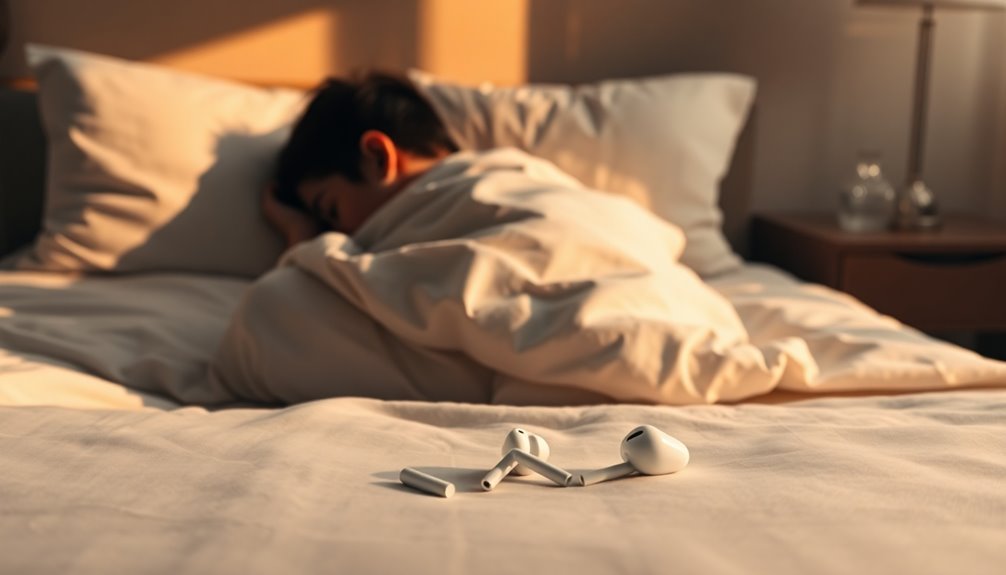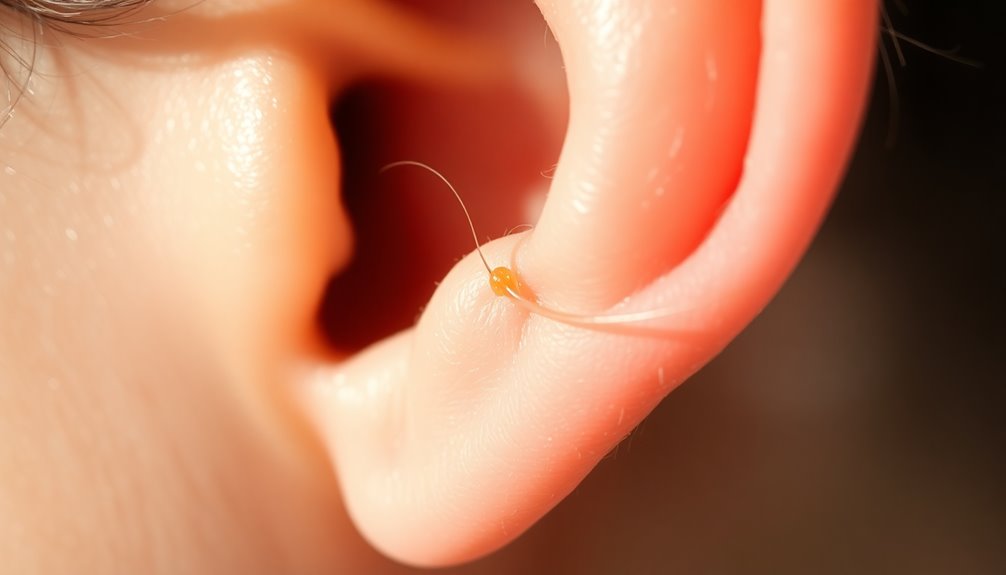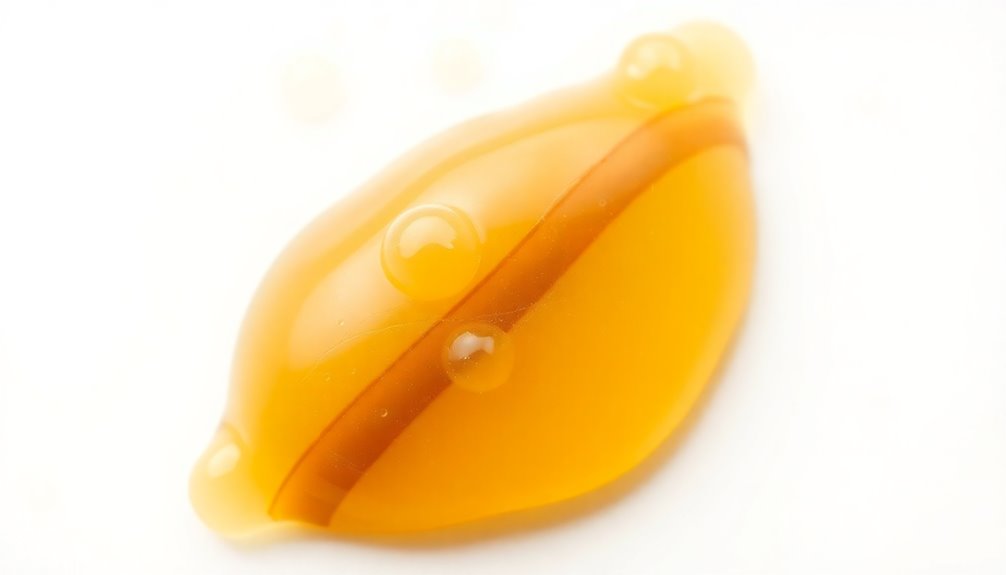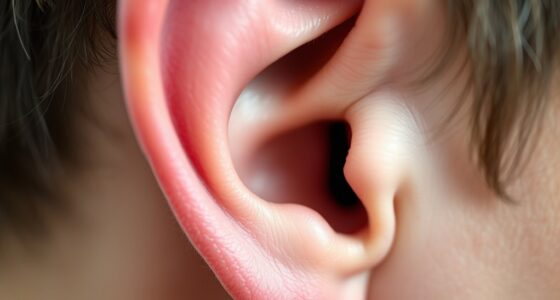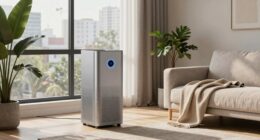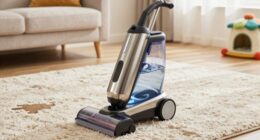You might think sleeping with AirPods in is perfectly fine, but it comes with surprising health risks. Prolonged use can lead to ear infections and discomfort due to moisture build-up and earwax accumulation. You also risk noise-induced hearing loss, which could contribute to anxiety or social isolation. Plus, battery malfunctions could pose serious safety concerns while you're sleeping. The lack of hygiene from not cleaning them regularly can further increase your chances of infections. If you want to protect your ear health and enhance your sleep, there are safer alternatives you might find interesting.
Key Takeaways
- Sleeping with AirPods increases the risk of ear infections due to moisture and bacteria buildup in the ear canal.
- Prolonged use can lead to earwax accumulation, discomfort, and potential complications affecting ear health.
- Wearing AirPods while sleeping can disrupt deep sleep stages, resulting in reduced overall sleep quality and increased anxiety.
- There is a risk of battery malfunction, which could lead to overheating or fire hazards while you sleep.
- Alternatives like specialized sleep earbuds or headphones can enhance comfort and sleep quality without the associated risks of AirPods.
Health Risks of Sleeping With Airpods
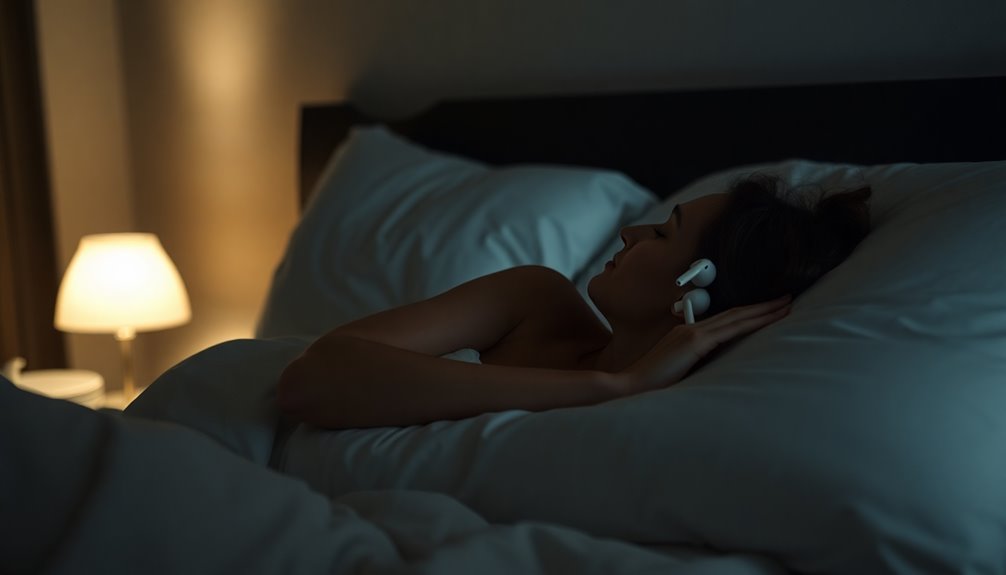
Sleeping with AirPods in can expose you to several health risks that might not be immediately obvious. For starters, wearing them for extended periods creates a warm, moist environment in your ear canal, increasing the likelihood of ear infections, like Otitis Externa. You might also notice more earwax build-up, which can lead to discomfort and further complications. Furthermore, the chronic stress from discomfort may lead to increased anxiety that can affect your overall health. Additionally, chronic exposure to loud sounds has been linked to noise-induced hearing loss, emphasizing the need for caution with volume levels.
If you're cranking up the volume, you risk damaging the delicate hair cells in your ears, potentially leading to noise-induced hearing loss. Prolonged use can cause physical discomfort, ear pain, or even soreness from the pressure of the AirPods. Prolonged exposure can also disrupt natural sleep cycles, contributing to issues in your overall sleep quality.
There's also a risk of battery malfunction, which could lead to overheating or even fire if damaged. Plus, wearing them while you sleep can prevent you from hearing external sounds, like alarms, which could pose safety concerns.
Let's not forget hygiene—failure to clean your AirPods regularly can exacerbate the risk of infections. Overall, these health risks can significantly impact your well-being, so it's worth considering alternatives for a safer sleep experience.
Effects on Sleep Quality
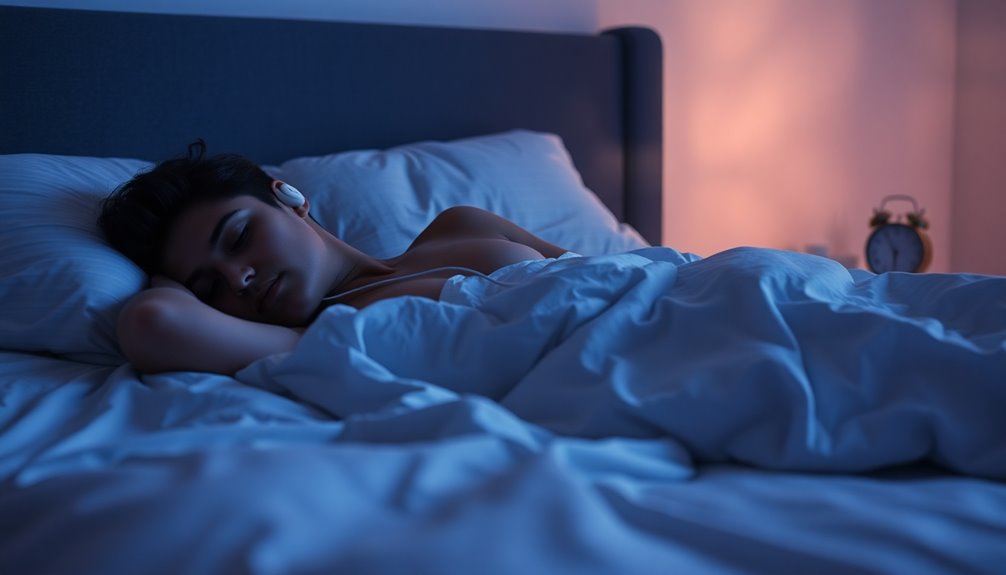
Many people don't realize that using AirPods while you sleep can seriously disrupt your sleep quality. While they might help you fall asleep initially, the presence of earbuds can interfere with your deep sleep stages. This interference reduces the restorative nature of your sleep, making you feel less refreshed upon waking. You might find yourself in lighter, less restful sleep cycles, which can lead to chronic fatigue.
Over time, you may develop a dependency on your AirPods to drift off, making it hard to sleep without them. This reliance creates a negative impact on your natural sleep habits, causing disturbances whenever you can't access your device. Additionally, the positioning of the earbuds can lead to discomfort, especially if you sleep on your side. This discomfort can further disrupt your deep sleep, compounding the negative effects on your overall sleep quality.
Moreover, the use of AirPods can trap moisture and earwax, potentially leading to increased ear infection risk. In the long run, these habits can contribute to chronic sleep issues, affecting your daily functioning and energy levels. Ultimately, while AirPods may seem convenient for sleep, they can have a detrimental impact on your sleep health and well-being.
Physical Discomfort and Injury
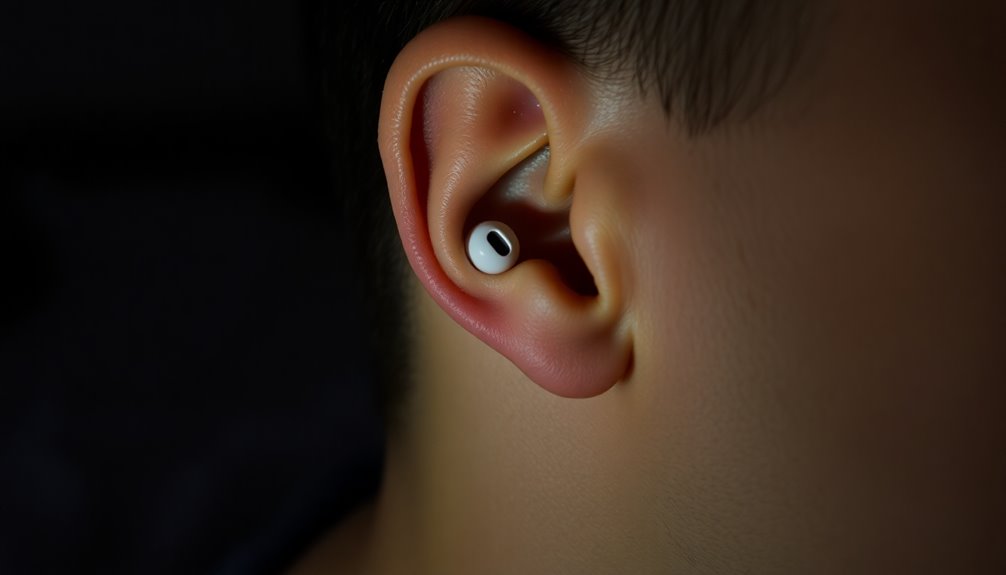
Using AirPods during the night can lead to significant physical discomfort and potential injury. The pressure on your ear canal can cause pain or soreness, especially if you sleep in a position that exacerbates this pressure. The weight of the AirPods adds to your discomfort, leading to ear fatigue and tenderness over time. If you ignore these signs, your overall sleep quality may suffer. Additionally, AirPods designed for daily use may not be suitable for prolonged periods of wear during sleep.
There's also a risk of injury. AirPods can become dislodged while you sleep, causing pressure against your ear or even lodging in your ear canal. If they shift during the night, they can harm your ear, especially if they're not properly fitted. This can range from minor discomfort to more severe ear canal damage.
Moreover, standard AirPods aren't designed for sleep, which may lead to headaches or increased pressure points. Their lack of breathability can cause moisture buildup, resulting in discomfort or potential infections. To avoid these issues, consider adjusting the fit or opting for sleep-specific earbuds. Taking regular breaks from using AirPods during sleep can help prevent long-term physical discomfort and maintain ear health.
Battery and Radiation Concerns
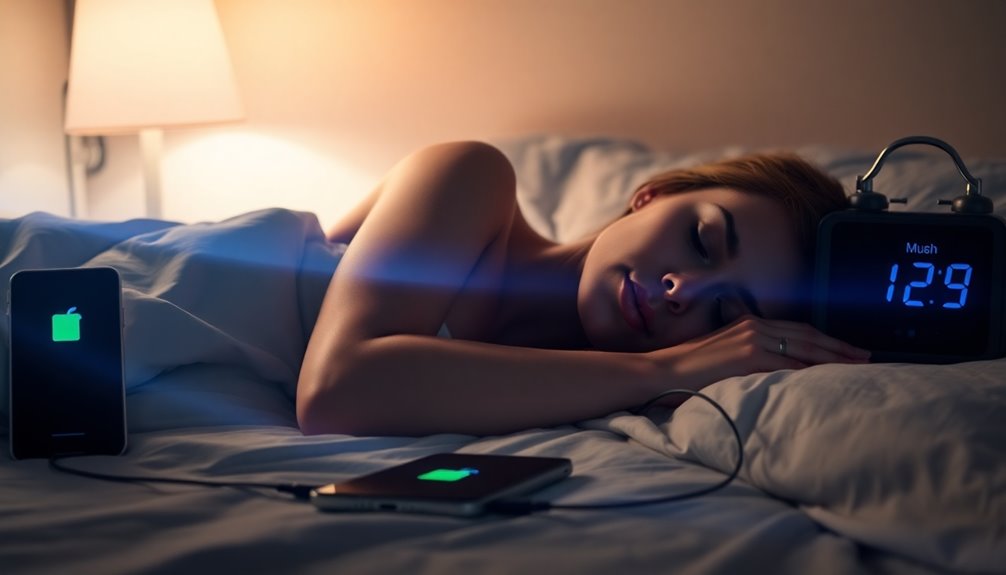
When you wear AirPods overnight, you may unknowingly expose yourself to various battery and radiation concerns. One major issue is the risk of overheating. Electronic devices like AirPods can malfunction and become hot, posing a safety risk that you might not notice while you sleep. If something goes wrong, you could miss the signs of a malfunction. Leaving them on for extended periods without monitoring increases these risks. Although rare, there's a theoretical chance of a battery-related fire if the device is damaged or malfunctioning.
On the radiation front, AirPods emit radiofrequency (RF) radiation, which gets absorbed into your skull, brain, and ear tissues. While this non-ionizing radiation is deemed safer than ionizing radiation, it still carries potential health risks, including increased cancer risk and cellular stress. With AirPods snugly placed in your ear, the proximity of RF radiation to brain tissues could be a concern. Many scientists argue that existing EMF exposure limits set by regulatory bodies may not adequately protect public health, leaving you exposed to potential long-term effects. However, 70 years of research indicates that low-level non-ionizing radiation is not harmful, providing some reassurance about the safety of using these devices.
Hygiene and Maintenance Issues
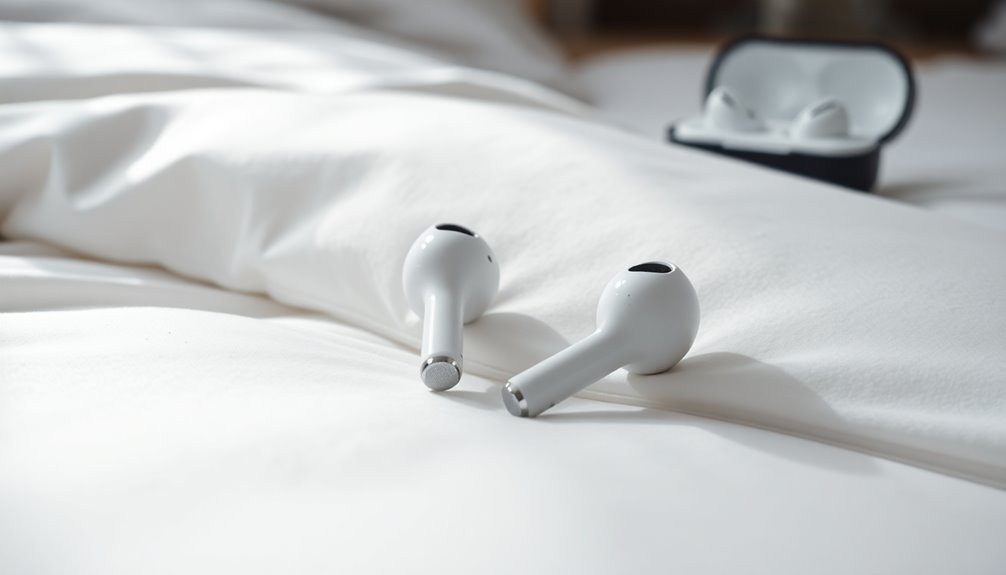
While battery and radiation concerns are important, hygiene and maintenance issues also play a significant role when it comes to wearing AirPods overnight. Sleeping with AirPods can cause earwax accumulation in your ear canal, potentially leading to serious ear health problems. This buildup can impair audio quality and clog the AirPods' meshes, making it crucial to keep your ears clean.
Moisture is another concern. In-ear earbuds can trap moisture, promoting bacterial growth and increasing the risk of infections, especially if you wear them to bed after a shower. Regular cleaning of your AirPods helps prevent bacteria transfer into your ear canal, but remember to dry them thoroughly afterward. Maintaining clean AirPods is essential for minimizing the risk of transferring bacteria into your ear.
To maintain hygiene, clean your AirPods with a soft-bristled brush and micellar water for the meshes, while using a soft, dry cloth for the body. Avoid abrasive materials or sharp objects. Proper cleaning methods not only help prevent skin irritation but also keep your AirPods functioning optimally. If you have allergies or sensitivities, check the materials in your AirPods to avoid reactions. Regular maintenance is key to ensuring comfort and longevity.
Safe Usage Guidelines
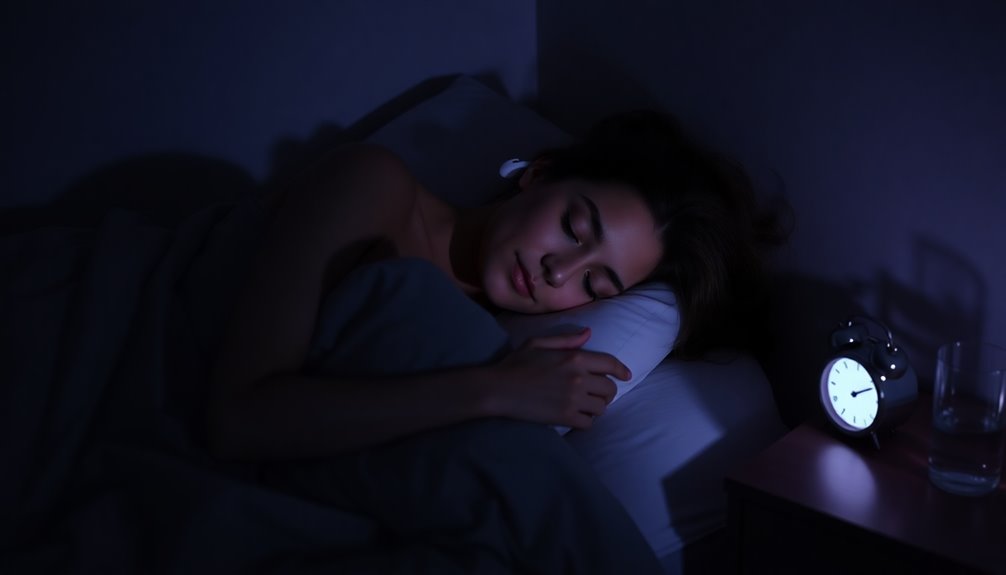
To ensure a safe experience with AirPods during sleep, it's crucial to follow some essential usage guidelines. First, always keep the volume at a moderate level to avoid noise-induced hearing loss. Continuous exposure to sound, even at low volumes, can strain your ears, so consider taking breaks to give them a rest. Additionally, be aware that hearing loss is linked to dementia and social isolation, making it even more important to protect your hearing while using AirPods.
Choose the right size AirPods to prevent discomfort and potential injury. Be mindful of your sleep position; avoid lying on your side with AirPods in, as this can lead to ear pain or soreness. If you notice any physical discomfort, remove them immediately.
Be aware of the risk of ear infections due to moisture and bacteria trapping in the ear canal. Regularly check for signs of earwax buildup, as this can lead to impaction. Additionally, inspect your AirPods for any damage, as faulty batteries can overheat. Always store them in their case when not in use to prevent any battery-related issues. Following these guidelines will help you enjoy your AirPods safely while you sleep, minimizing risks to your ear health and overall well-being.
Alternatives to AirPods for Sleep
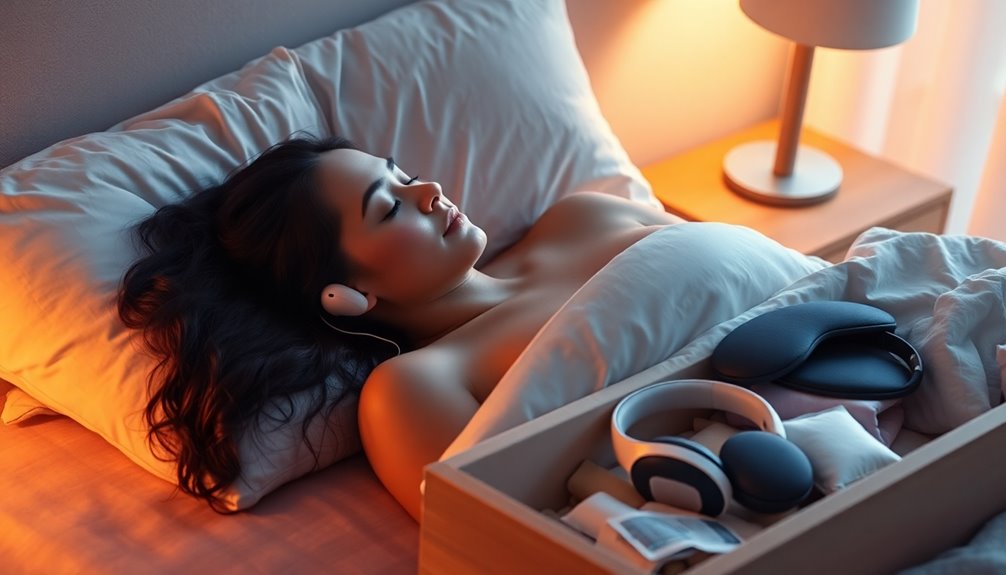
If you're looking for a better way to enjoy audio while you sleep, consider exploring alternatives to AirPods. Earbuds specifically designed for sleep, like Ozlo Sleepbuds, offer an ultra-comfortable fit and effective noise-masking capabilities. They even track your movements and can wake you with a gentle alarm. The Soundcore Sleep A20 is another option, small and unobtrusive, boasting a 14-hour battery life. If you prefer something even smaller, the QuietOn 3.1 Sleep Earbuds deliver excellent low-frequency noise cancellation and have a battery life of up to 28 hours. Additionally, most of these dedicated sleep headphones are designed for comfort during sleep, ensuring a restful experience. Investment in comfortable sleep accessories can significantly enhance your overall wellness, especially considering the importance of long-term financial planning for such purchases. Furthermore, choosing headphones with high sound quality can further improve your listening experience while you drift off to sleep.
Moreover, many of these sleep headphones help create a calm environment that can improve your sleep quality. For a different approach, headband-style headphones like Musicozy provide comfort for side sleepers and have a solid battery life of 10 hours. The LC-Dolida Sleep Mask and Headphones combine a sleep mask with sound cancellation, making them a budget-friendly choice.
If you're open to on-ear headphones, the Bose Noise Cancelling Headphones 700 excel in comfort and noise cancellation, while the Soundcore Life Q30 offers a budget-friendly alternative with impressive battery life. With these options, you can find the perfect solution for a restful night's sleep.
Frequently Asked Questions
Can Airpods Affect My Hearing Even at Low Volumes?
Yes, AirPods can affect your hearing even at low volumes. Prolonged exposure to any sound can strain your ears over time, leading to potential hearing damage. Even at low levels, continuous sound exposure can disrupt your ears' recovery time and may contribute to issues like tinnitus. It's crucial to manage your listening habits and limit the duration you use AirPods to protect your hearing health in the long run.
Are There Specific Brands of Earbuds That Are Safer for Sleeping?
When it comes to safer earbuds for sleeping, you'll want to consider options like Soundcore Sleep A20 and Bose Sleepbuds II. These brands prioritize comfort and noise reduction, making them ideal for a restful night. The QuietOn 3.1 Sleep Earbuds offer excellent passive noise isolation, while Sony WF-1000XM5 provides great sound quality. Look for features like breathable materials and multiple ear tip sizes to ensure a comfortable fit throughout the night.
How Often Should I Clean My Airpods to Maintain Hygiene?
To maintain hygiene, you should clean your AirPods every 72 hours of usage time, which typically means once a week for regular users. If you use them more frequently, consider cleaning them more often. Check for dirt or wax buildup to see if cleaning's necessary. Focus on the speaker grilles and meshes to keep sound quality high, and use a lint-free cloth along with a gentle tool for effective cleaning.
Can Using Airpods While Sleeping Lead to Long-Term Ear Damage?
Using AirPods while sleeping can indeed lead to long-term ear damage. If you listen at high volumes, you risk noise-induced hearing loss. Additionally, trapped moisture and bacteria can cause infections, especially with prolonged use. Physical discomfort from pressure or poor fit can also lead to ear injuries. To protect your ears, consider taking breaks from using them and ensure you maintain proper hygiene for both your AirPods and your ears.
What Are the Signs of an Ear Infection From Earbud Use?
If you're using earbuds and notice signs of an ear infection, pay attention. You might feel sharp or dull pain, especially while lying down. Your ear could feel tender or hot, and you may see redness or swelling. Itching or a sensation of fullness might occur, along with temporary hearing loss. If you experience dizziness or a fever, it's vital to consult a healthcare professional to address the issue promptly.
Conclusion
In conclusion, while sleeping with AirPods might seem convenient, it comes with potential health risks, including sleep disruption and physical discomfort. You should consider the hygiene issues and battery concerns as well. Instead of risking your well-being, explore alternative options like sleep masks with built-in speakers or white noise machines. Prioritizing your health and comfort can lead to better sleep quality, so take a moment to weigh the pros and cons before drifting off with your AirPods in.
